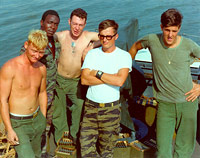
"How do you ask a man to be the last man to die for a mistake?"
23 April 1971, John Kerry testifying before the Senate Foreign Relations Committee
Smearing the antiwarrior
10 February 2004, Will Tacy, MotherJones.com
Conservative pundits and bloggers have a pair of military service crises on their hands. The first, of course, is President Bush's less-than-complete record with the Texas Air National Guard. The second is Sen. John Kerry's more-than-complete record as a Naval officer in Vietnam. Reviewed side-by-side, the records are as different as Texas and Massachusetts -- and that's not good news for the GOP. It's hardly surprising, then, that the Team Bush foot soldiers and their friends in the conservative press are taking aim at Kerry's second act, his record as a leader of the antiwar movement. Clearly, somebody in Karl Rove's considerable political orbit has concluded that, given the current mood of the country, painting Kerry as a radical peacenik might be productive.
That certainly was the approach adopted by Stephen Sherman in a January 26 Wall Street Journal op-ed. A Vietnam vet himself, Sherman argues that Kerry doesn't deserve the support of the thousands of other Americans who served in Indochina. Why? Because Kerry, having decided the war was wrong, spoke out.
"Service in Vietnam is an important credential to me. Many felt that such service was beneath them, and removed themselves from the manpower pool. That Mr. Kerry served at all is a reason for a bond with fellow veterans; that his service earned him a Bronze Star for Valor ("for personal bravery") and a Silver Star ("for gallantry") is even more compelling. Unfortunately, Mr. Kerry came home to Massachusetts, the one state George McGovern carried in 1972. He joined the Vietnam Veterans Against the War and emceed the Winter Soldier Investigation (both financed by Jane Fonda). Many veterans believe these protests led to more American deaths, and to the enslavement of the people on whose behalf the protests were ostensibly being undertaken."
So that's the strategy for the veterans in the GOP: Argue that Kerry turned his back on his brothers in arms, and even put them at greater risk by dissenting. But what's the strategy for the scores of Republican satraps and power-brokers who can't fire from behind the political cover of a service record? David Skinner offers a glimpse in a brief Weekly Standard column. Written with a certain light flair, Skinner considers Kerry's contributions to 'The New Soldier,' a 1971 book published by VVAW. While Skinner dutifully notes that Kerry doesn't actually seem to have contributed much, that isn't going to stop him from taking a shot at the senator. Skinner's strategy? Guilt by assocation.
"John Kerry seems to have had a way of eluding the bad odor that clings to his old associates. On "Meet the Press" in 1971, he appeared with VVAW member Al Hubbard, a veteran who was exposed around this time for lying about his rank and combat experience (he had seen no combat). While this confirmed suspicions about the dubious identities of many of the winter soldiers, it didn't keep Kerry from becoming famous. The young politician was able to have his cake and eat it, too, becoming the establishment, patriotic face of a radical, anti-patriotic movement. Quite a trick, really."
So now we know the GOP story line.
At worst, Kerry is a turncoat who somehow put his fellow soldiers in jeopardy because antiwar protests "led to more American deaths"; at best, he's an irresponsible gadfly who hung around with radical anti-patriots. And Bush? He's a patriotic guy who did his duty (even if nobody can remember him actually doing it). Talk about a trick.






